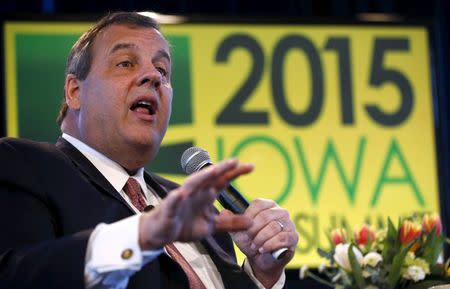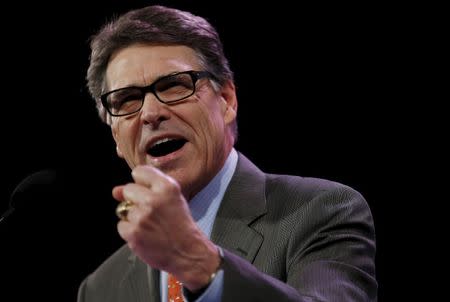Exclusive: Republican White House hopefuls attack Obamacare but take money
By Andy Sullivan WASHINGTON (Reuters) - Several Republican governors likely to run for president have secured hundreds millions of dollars under Obamacare while working to dismantle the healthcare law, according to a Reuters review of federal spending records. Governors Scott Walker of Wisconsin, Chris Christie of New Jersey, Bobby Jindal of Louisiana and former Texas Governor Rick Perry, all staunch opponents of President Barack Obama's 2010 Affordable Care Act, have collectively applied for and won at least $352 million through grant programs set up by the law, federal records show. The action is at odds with the public stance of all four potential candidates, who have blasted the law as an unprecedented expansion of government and called for its repeal. Aides told Reuters they saw no contradiction in applying for these grants while criticizing the law as a whole. "It's critically important that we continue these services for our citizens," said Walker spokeswoman Laurel Patrick. "Receiving federal grants that existed prior to the ACA is not the same as participating in the core elements of the ACA." The money in question stems from less controversial parts of the law that enhance public health and other nuts-and-bolts programs, rather than the insurance exchanges and expansion of the Medicaid program for the poor that have drawn fierce opposition from Republicans. Some of these programs were established by Obamacare, while others had existed in other forms and were expanded by the law. (Graphic: http://reut.rs/1FewtGN) For example, the law included $1.5 billion to enable medical workers to visit new mothers at home. The money has enabled some states to set up programs where none had existed and allowed others to expand existing programs. Wisconsin has more than doubled its home-visit program under Obamacare, according to state documents. It's not clear whether the Republican governors now considering running for the White House would protect these programs if they won the November 2016 presidential election. Aides to Walker, Christie and Perry either declined to comment or didn't respond. A Jindal aide said these programs would work better if states were given more discretion over how to spend federal money. UNITED IN OPPOSITION Republicans have been united in their opposition to the healthcare reform since it passed Congress with only Democratic votes five years ago, and many potential presidential candidates are eager to demonstrate their anti-Obamacare bona fides. Walker has called the law an "abysmal failure" and Perry has blasted it as an "abomination." Christie called it a "failure" and Jindal told a gathering of conservative activists in February that "we must repeal every single word of Obamacare." Walker, Perry and Jindal also supported a legal challenge that fell short of striking down the law in 2012 but enabled states to opt out of the Medicaid expansion. Still, Republican governors have to balance their opposition to the law with their obligation to look after the needs of their states. The federal government accounts for nearly one in three dollars of state revenue, and the Affordable Care Act has been an important source of much of that money in recent years. It provides $10 billion for public health and $425 million to train nurses and other health-care workers. The money isn't handed out automatically: state governments, hospitals and other organizations have to apply for it. "There's a lot of hypocrisy when it comes to some Republicans and Obamacare," said Greg Valliere, a nonpartisan political adviser to Wall Street clients. "As my father used to say: 'Do as I say, not as I do.'" Walker's administration has accepted at least $69 million through Affordable Care Act grant programs, according to a Reuters analysis - a figure that does not include programs that the U.S. Health and Human Services Department says existed before the law took effect. It also excludes grants that went to state universities or other entities not directly under Walker's control. During that period, Walker returned $38 million that his Democratic predecessor had secured to set up a state-based insurance exchange, and turned away hundreds of millions of dollars to help expand Medicaid. He expanded the state's own Medicaid program to cover more residents without federal money, in part by moving 80,000 participants onto private insurance plans subsidized by Obamacare. In Louisiana, Jindal's administration has accepted $60 million in Obamacare grants while refusing to expand Medicaid and set up a state exchange. "Most of these grant funds are used for state initiatives that existed long before Obamacare ever became law," Jindal spokesman Mike Reed said. In Texas, Perry took in at least $148 million in Obamacare grants while refusing money tied to the insurance exchange and the Medicaid expansion. He stepped down as governor in January. "Governor Perry has long called for flexibility from the federal government so the states can implement health care programs in the best interests of their citizens," spokeswoman Lucy Nashed said. In New Jersey, Christie has not set up an exchange but has accepted the Medicaid expansion on the grounds that it will help low-income residents and hospitals in his state. His administration has secured at least $75 million in grant money, on top of the additional Medicaid dollars. "The governor has said he will make decisions with respect to the law that are in the best interest of New Jerseyans," spokesman Kevin Roberts said. (Additional reporting by Luciana Lopez, editing by Ross Colvin)




